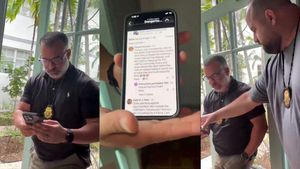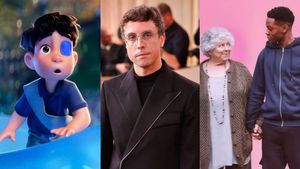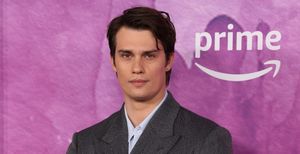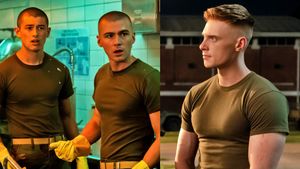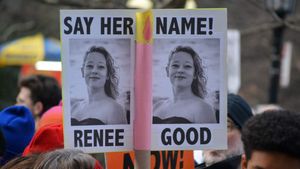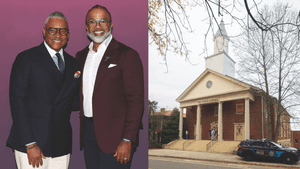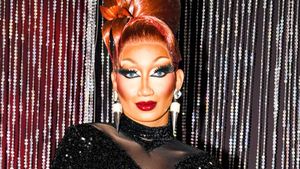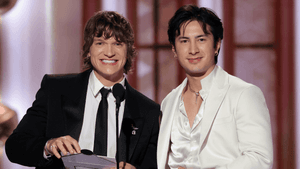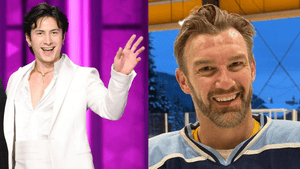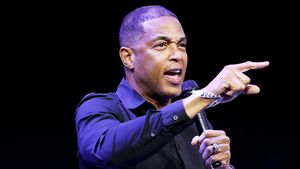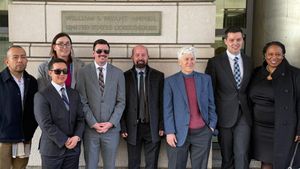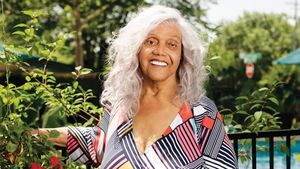Treatment GuideJust DiagnosedSex & DatingAfrican AmericanStigmaAsk the HIV DocPrEP En EspañolNewsVoicesPrint IssueVideoOut 100
CONTACTCAREER OPPORTUNITIESADVERTISE WITH USPRIVACY POLICYPRIVACY PREFERENCESTERMS OF USELEGAL NOTICE
© 2026 Pride Publishing Inc.
All Rights reserved
All Rights reserved
By continuing to use our site, you agree to our Privacy Policy and Terms of Use.
Aiden Shaw has been sober since June 4 and is looking for a Narcotics Anonymous meeting on Fire Island. To say that the 43-year-old Shaw is an adult film superstar is not an overstatement. The "first man" of gay porn, with more than 50 films to date, Shaw has just completed his seventh book: Sordid Truths, an autobiographical prequel to his autobiography My Undoing, which was published in 2006. Sordid Truths is Shaw's story of being financially broke as a scholar at the University of Sussex in England, discovering prostitution after finishing the first year toward his degree, and being lured by the "heady mix of sex and money" to a career as an adult star. The second youngest from a large Irish Catholic family, he quickly established himself as one of the most popular porn personalities in the world. I Skyped with Shaw about his new memoir, his nascent commitment to the NA program, the problems of HIV and methamphetamine in the United States, and a personal realization about monogamy. I read that you were attending school. I undertook a master's in creative writing a couple of years ago -- is that what you're referring to? But I am now looking at universities in America that offer Ph.D. programs. You guest-edited an issue of Poz magazine in 1997. What was that like? It was interesting. Sean Strub, who runs it -- who used to run it -- he's an interesting and intelligent man. It gave me an idea of what it would be like to work for a magazine, and I'd never work for a magazine again in my life! But I'm not saying that was a bad experience. I can't imagine how people come up with something every month or every week. We came up with good stuff because there was a good team, and I was fresh at the moment, so we got a really good issue. I think it was a really successful issue. You became HIV-positive in 1997. Has being positive changed the way you look at the world, or has it changed you as a man? It might have before that, but I'm not sure. It feels as though it hasn't changed me. But it's hard to say what I would have been like without the experience of having HIV. Do you think that the rest of the world looks at the AIDS epidemic -- specifically in Africa and the Third World -- differently than here in the States? I wouldn't speak about America as having one way of thinking or feeling. America is different pockets of ideas and people. Also, I don't really like to speak for anybody else -- ever. That said, I don't see much difference in the way people view it. On a personal level, I've only dealt with patients and doctors in the States and England, and they all seem equally well-informed. I think there's been a fetishization of HIV -- with all the [attention to] barebacking and "gift giving" and all this nonsense. In England that's way not as fashionable or culty or popular. I'm interested to know what you think about the resurgence of barebacking and specifically its prevalence in gay porn. Was that a question? Yes, it has happened. You don't issue a judgment about it? Of course not. Why would I? I read somewhere that you're a big believer in or that you want-- I'm not a big believer in anything. But I've read you were very interested in monogamy. Interested in monogamy? I've changed my mind. So what happened between when you made those statements about monogamy and where you are now? The phase I'm in at the moment is that I never want a relationship again in my life. [Laughs] Call it hurt -- call it anything you want -- but that's how I feel. The idea of monogamy doesn't come into my radar. I don't even want a boyfriend, let alone a lover or a monogamous partner. I'm really happy being single. I'm really happy with my own company. If I meet someone I like, then I might change my mind again. I follow you on Twitter and one of the things you tweeted was that you were going to an NA meeting. Does that mean you're in recovery? Yes. Congratulations. I'm happy to talk about that. Do you think one can have a path of moderation about drugs and alcohol? I went to a dinner party last night where everybody was doing cocaine and drinking, and I didn't. And it wasn't difficult at all. Tonight, the same thing: I'm expected to go to a club with them, and it's fine. I'll just go home early and go to bed and feel good, you know? And I've never felt better in my life. I can't stress enough how wonderful it is. I feel like my 20s and 30s... Well, what a shame, you know? Of course it's all great material for my work. But it seems like such a shame because now I don't feel down all the time. I feel like, "Oh! This is what people were fuckin' meant to feel like." Like, "Oh, this is it. I get it finally." Because a few months ago I wanted to kill myself, and I can't believe this turnaround is so different. Wow. Before I gave up drugs, I was on Valium and sleeping tablets all the time. Now I have a good night's sleep, and I can't understand how I've had such good sleep. It's nuts. Do you think there's any drug that's more dangerous than another? Or are they all equal? Technically, I'm guessing alcohol causes most harm in the world. I also read an interview where you said that crystal turns us all into teenagers. It just turns me into a complete dick -- in every sense of the word: sex and mentally... I used to like crystal more than other drugs because I thought that it made me better than I am. I could dance for hours and tell jokes and be really quick. But in time, I didn't like the creature that it created. He wasn't sexier, funnier, with a quicker wit. He was a complete freak! Needless to say, I didn't want to be him anymore. He was embarrassing, and the memories of what he did haunted me. I can't believe some of the things he said and did. Anyway, no more. He's been put to pasture. So how do you stay on the straight and narrow when it comes to drugs and partying? I feel solid in my sobriety. I've made a commitment to NA, and I'm sticking to it. I'm pretty disciplined. I made the decision. That's it. I've never been to an NA meeting, but I've done therapy. Yeah, I've had lots of therapy, but none of it seemed to make a dent in my drug and alcohol use. But NA is different. They really don't push you. But I wish they'd been more pushy -- because I wish I'd stopped years ago. They don't advertise, but I wish someone had said, "Try NA." I even asked therapists if I should go, and they said, "No, don't bother. You won't get anything out of it." But I wish someone had just said, "Try NA, for God's sake!" Do you exercise? Currently, more than ever. There's this book, Staying Sober, and it has some little tricks and things that help -- like "get your exercise." So I exercise more now, and I'm getting in great shape again, which is [laughs] just a bonus. Skin's better, cheeks are rosier, and all that. There's also this really nice little slogan called HALT: h stands for hungry, a stands for angry (but I use it for anxious because I don't really get angry), l is for lonely, and t is for tired. So if you want to drink, you're supposed to say, "Am I hungry, anxious, lonely, or tired?" And it tends to be one of those reasons. These tricks help; they really help. But I'm past the first 30 days, so the cravings have kind of gone away. And then it's just kind of a mental habit. A few people have said to me, "Don't get too confident." But I feel really solid about it. What did you hope to accomplish with Sordid Truths? So many things. I wanted to produce something that was entertaining -- with moments of genius -- that was beautifully written, would stretch my artistic abilities and be wholly satisfying and moving for me and for my reader. [Laughs] I guess when you're starting a project you have all those hopes and dreams, some more easily achievable than others. How long did it take you to write? I had a very tough deadline -- about three months. My last book took eight years, so it's not as though I always write books quickly. Still, I like what I've managed to come up with. I think it is my best book yet. I was really impressed by how candid you are in the book. I can't imagine what else you would do. I was brought up to be honest. I wouldn't know how you would make up a lie -- or why you'd want to. I can't comprehend any other way. That's really liberating. You can thank or blame my mother for that. She taught all her kids to be honest -- also to be independent and do their own thing, their own way. You wrote My Undoing, your first autobiography, as you were going through the experiences? That's right. So writing Sordid Truths, looking back on those experiences -- was it different? Sure. I'm in my 40s now, and I'm writing about my 20s. It took a lot of sessions with my therapist just coming to terms with that. She said, "You've chosen a very bad time in your life to write about your 20s." Your 40s are all about realizing what you were and what you are now, what you've lost and what you've gained. For these reasons, writing this book was more mind-expanding yet traumatic. When I finished it, I just looked at the computer and shuddered. I didn't want to touch it. In the acknowledgments to the book I thanked my publisher for asking me to write it in such a short time because I think I've produced something I'm really happy with, but at the same time it makes me never want to write again. If you could give gay youth some required reading, what three books would you recommend? Number one would be A Single Man by Christopher Isherwood. It's, I think, his greatest book. So tight and so beautifully written. He manages to get inside a character and all the little things that go on inside a human's mind. And it's unabashed, because sometimes it's ugly and sometimes it's just mundane. But when you've got that kind of skill for writing, it's all delicious. It's a really short book, so it's a must, that one. And Oscar Wilde's fairy tales, The Happy Prince, just to remind you to tap into your heart. And I really loved The Year of Magical Thinking by Joan Didion. Not that it has anything particularly to do with being gay, but it addresses feelings, pain, love -- and we could all do with understanding these things a little better. Personally, I get off on her clarity and her ballsy delivery. I want to get a little Meet the Press with you, because I'd like your reaction to a review of your last book from Publishers Weekly: "Particularly telling is his experience being struck by a car when he's too high to do anything but lie in the road; he's left with a brain lesion, broken bones, and paralysis on his left side. Not every life story has to have an epiphany, but readers who suffer through his recovery are bound to feel cheated when he emerges from treatment completely unchanged. When the book ends abruptly -- as if he'd run out of space in his journal and couldn't be bothered to buy a new one -- he's back with Mr. Wrong." Do you think that's accurate -- that you emerged from treatment "completely unchanged"? I don't think it's possible to go through any experience and be unchanged. It was autobiographical, not fiction. There was no punch line, and anybody who was looking for it wasn't reading the wrong book. You don't read autobiographies for punch lines. And if you do, then you're stupid and you're not actually looking for reality. Because reality doesn't do that. Reality doesn't have happy endings or epiphanies. And I'm sorry if the book ended abruptly, but I wrote it up to present day, and the rest of life simply hadn't happened yet.
From our Sponsors
Most Popular
“So much life to live”: Eric Nieves on thriving with HIV
September 03 2025 11:37 AM
The Talk: Beyond the exam room
August 13 2025 3:15 PM
Messenger RNA could be the key to an HIV vaccine — but government cuts pose a threat
August 20 2025 8:02 AM
It’s National PrEP Day! Learn the latest about HIV prevention
October 10 2025 9:00 AM
Amazing People of 2025: Javier Muñoz
October 17 2025 7:35 PM
The lab coat just got queer
August 21 2025 10:00 AM
The Talk: Owning your voice
August 25 2025 8:16 PM
The Talk: Navigating your treatment
August 01 2025 6:02 PM
“I am the steward of my ship”: John Gibson rewrites his HIV narrative
September 16 2025 2:56 PM
Plus: Featured Video
Latest Stories
HIV-positive men stage 'Kiss-In' protest at U.S.-Mexico border
December 01 2025 12:56 PM
What the AIDS crisis stole from Black gay men
December 01 2025 6:00 AM
The Talk: Starting the conversation
July 25 2025 4:47 PM
Thanks to U=U, HIV-positive people can live long, happy, healthy lives
July 25 2025 2:37 PM
How the Black AIDS Institute continues to fill in the gaps
July 25 2025 1:06 PM
“I felt like a butterfly”: Niko Flowers on reclaiming life with HIV
July 23 2025 12:22 PM
Dancer. Healer. Survivor. DéShaun Armbrister is all of the above
July 02 2025 8:23 PM
BREAKING: Supreme Court rules to save free access to preventive care, including PrEP
June 27 2025 10:32 AM
1985: the year the AIDS crisis finally broke through the silence
June 26 2025 11:24 AM
VIDEO: A man living with HIV discusses his journey to fatherhood
June 10 2025 4:58 PM
Trump admin guts $258 million in funding for HIV vaccine research
June 03 2025 3:47 PM
Grindr is reminding us why jockstraps are so sexy and iconic
May 02 2025 5:36 PM
HRC holds 'die-in' to protest Trump health care cuts
April 28 2025 2:11 PM
Two right-wing Supreme Court justices signal they may uphold access to PrEP and more
April 21 2025 4:10 PM
500,000 Children at Risk: PEPFAR Funding Crisis
April 08 2025 3:51 PM
Broadway's best raise over $1 million for LGBTQ+ and HIV causes
April 03 2025 7:15 PM


































